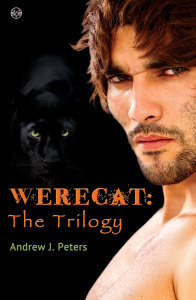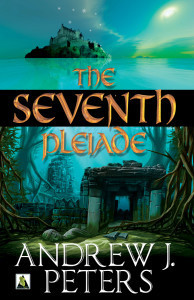Andrew J. Peters's Blog, page 13
April 5, 2016
Werecat Made it to the Readers’ Choice Final Round
Many thanks to all my fans, friends and family who helped Werecat: The Trilogy become a finalist in The Romance Reviews’ annual Readers’ Choice awards!
Now the book competes in a final round with voting open through April 30th.
Werecat was nominated in the category of GLBT-Action Adventure. Would you help by giving it a vote here? There’s no cash prize, but even more valuable, winning the award gives a huge boost of exposure to the series, and of course there’s some bragging rights involved. 
Thanks so much!
Share this:





March 29, 2016
Come out to the Rainbow Book Fair
I’ll be participating in the Rainbow Book Fair again this year. The Fair is happening on Saturday, April 9th 12:00 – 6:00 PM at John Jay College. It’s a great event for seeing what’s happening in the world of LGBT literature. Click here to see the line-up of authors from Bold Strokes Books.
For me, there’s nothing like being part of a community of folks who love LGBT literature. It’s kind of like a Pride parade for authors, publishers and readers, and like my first Pride parade, which, as a random by-the-by, was back in 1991 in Toronto, I remember fondly my first Rainbow Book Fair in 2013.
I was doing early promotion of The Seventh Pleiade, did one of my first public readings, handed out bookmarks to advertise my book, and talked with many dozens of people who stopped by my publisher’s table. That day, I felt like I was really an author, and I think as authors we need those kind of experiences, stepping out of our sequestered lives in front of a computer.
This year, I’ll be reading from Banished Sons of Poseidon at 5:30 PM, and I’ll be at and around the exhibit table for Bold Strokes Books. Drop on by and say hello. 
Share this:





March 14, 2016
Vote for Werecat in TRR’s Readers’ Choice Awards
I’m happy to share that Werecat: The Trilogy made it into the second round of The Romance Reviews Readers’ Choice Awards.
Now, nominations for the finalists begins! From March 14th to March 31st, readers nominates the books they want like to move on to the final round. Naturally, I’d be forever grateful if you voted for mine. 
Here’s the link where you can nominate Werecat: The Trilogy. Many thanks!!
Share this:





March 6, 2016
Read an excerpt from The Seventh Pleiade
Continuing with my excerpt feature, I’m posting a short passage from The Seventh Pleiade.
The Seventh Pleiade was my first novel, and naturally very close to my heart. I started writing stories about Atlantis back in 2005, but they were jumbled together in a dense, mismatched “epic,” which I thought for a while would work as interwoven past and present narratives.
The problem was those narratives were too loosely related. Gradually, what made a whole lot more sense was to isolate complete stories from the manuscript and work on a series from there. The most complete story that emerged happened to be about the last days of Atlantis, and that unexpected start to the series appealed to me.
The Seventh Pleiade is the story of a young prince Aerander who discovers a centuries-old conspiracy that is at the root of his kingdom’s demise. He’s also a young man figuring out his place in the world, and coming to terms with past wrongs to his cousin and best childhood friend Damianos, as well as the social and political pitfalls of boy-boy romances.
At readings and online venues, I’ve shared parts of the story on the ‘coming-of-age’ side. Here I thought I’d post a passage that relates to Aerander’s adventure. A brief set up: about a quarter-way into the story, Aerander goes looking for his missing cousin Damianos one night in the woods beyond the palace where they used to spend a lot of time as boys. At an ancient shrine, he stumbles into what seems to be a burrow and has to find his way out.
~ ~ ~
The ground was cold and rough like granite. He must have fallen down a hole into some sort of cavern.
But something had changed very significantly. The air was deathly still. There were none of the earthy odors of the forest, and none of its boggy humidity. Like he had been boxed up deep underground in a tomb.
Aerander sprung up on his feet and cried out for help. He stopped. There was no one in the forest to hear him. He would have to wait for daylight and hope someone would pass by the spot where he had fallen.
That was crazy. It could take days for someone to find him. Aerander’s father would be enraged when he found out his son had run off from the banquet into the woods.
Fumbling blindly, he felt an earthen wall and drew up against it. He tried to get a footing so he could climb up to the top. It was too dark to make out a workable route, and the passage seemed to be vertical. With his hands and feet, Aerander managed to raise himself a few feet, and then he slipped and landed bottom first on the floor.
His chest heaved, and his hands were slick with sweat. Shuffling around on his hand and knees, he felt around on all sides of him: one wall, two walls, three walls, and an opening in the space behind him. He wondered again how he landed there without breaking a leg. The place was unnaturally cold, as though it was packed with ice. Is that how it felt deep underground? Caverns were cold but not that cold. No matter, there was only one way to go.
Aerander crawled forward, and a few feet in, the air turned warmer. Why was that? Was there an underground spring, warm like a volcanic pool, somewhere ahead? Red light glimmered from a distance away. He figured he must be at the dead end of some sort of subterranean passageway. That meant there was another way out. He righted himself and stepped down the tunnel, eyes shifting and shoulders drawn up tight.
Somewhere further in there was a lamp, that red light, and he could use it to orient himself. He would find his way back up to the forest. What a stupid thing to do—tripping down a hole!
After twenty or so paces, the tunnel took a sharp turn, and the red light brightened the tunnel a little more. Things looked somewhat familiar: walls carved out of rock like the palace cellar where they stored wine and grain. But the place where he fell down was many stadia from the palace complex. Could there be a tunnel that stretched the whole length of the Citadel? Aerander had never heard of anything like that, but the idea was encouraging. Maybe there was a way to get back to the palace, underground, and he could sneak up through the cellar and get back to the banquet with a little story that he had taken a long walk around the grounds.
Aerander rounded the corner, stepping quietly so as not to be heard, and a few yards down he came to a metallic, arched door on one side of the tunnel. It was unusually high, like the threshold of a statehouse or a temple. At its apex, there were strange engravings. If they were letters, they were not of the Atlantean or Lemurian varieties Aerander had studied. He imagined it signified some sort of shrine, archaic like the Temple of Cleito and Poseidon, though the ancestors didn’t build temples or any kind of buildings beneath the earth to Aerander’s knowledge. Even the necropolis and the mausoleums were above the ground.
There was no knob or handle for the door. Aerander pushed against it. It was too heavy to move, or maybe it was bolted from the other side. In the dim light, he ran his hand along the surface, searching for some mechanism to open it.
The door scraped forward just enough for him to step in sideways. Had he triggered some device? The tunnel looked empty in both directions. Aerander couldn’t see all the way to the end, but it had to be quite a distance. He stepped around the door and entered the chamber.
The first thing he noticed was light coming from a single lamp hanging on a wheeled stand some yards within. The space was vast. Its walls and ceiling were entirely in shadow, but there were some three dozen pedestals, each one the size of a cot, in the center, by the lamp. Most of the pedestals were bare, but two held crude sculptures of men.
He glanced back to the door, still open, his way out if he had to make a quick escape. He wasn’t supposed to be there, but on the other hand, no one could fault him for ending up there by falling down a hole in the forest. Someone had been in the chamber recently, but no sounds were coming from the tunnel. He stepped over to one of the pedestals and examined the sculpture-thing.
It wasn’t bronze or stone but some kind of cloth. Actually, it looked as though someone had taken many long, thin cloths and wrapped them over and over, finally depicting the shape of a young man.
He reached to touch it and quickly drew his hand back. It wasn’t cloths wound up together. There was a something, someone, beneath the coverings.
Share this:





February 9, 2016
A Short Recap of the LGBT Mystery Writers Panel
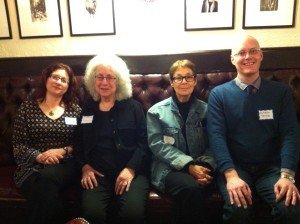
L to R: R.G. Emanuelle, Catherine Maiorisi, Ann Aptaker, and me
It was a great night last Wednesday at the historic Salmagundi Art Club in Greenwich Village. For those who missed it, here’s a short recap.
The Mystery Writers of America (MWA) – New York chapter invited four authors to talk about the state of LGBT fiction. Moderated by Ann Aptaker (Criminal Gold, Tarnished Gold), the panel presentation was titled: Thrills, Chills and Sex in LGBT Crime Fiction: We Read Your Books, You Should Read Ours. The other panelists were R.G. Emanuelle (Add Spice to Taste, Twice Bitten) and short story writer Catherine Maiorisi (Family Matters, Fresh Slices).
The central question we addressed was why do so few books with LGBT characters find a mainstream audience?
The answers were multifarious.
Some of us talked about the continued lag in appreciation or even interest in LGBT stories by non-LGBT readers, who of course make up at least 90 percent of the fiction market. Others discussed the tendency of the traditional publishing community to pigeon-hole any book with LGBT characters as niche or genre, thereby relegating books to tiny spaces on the shelves of brick-and-mortar booksellers where they are harder for readers to find; or in the case of department stores, which focus on books with “broad interest,” LGBT books are nowhere to be found.
As each of us have had our work published primarily by small presses (Bold Strokes Books, Bella Books, Yiva Publishing), we spoke to the gap in resources to achieve visibility in the mass market. This impacts everything from getting high impact industry reviews to garnering nominations for awards to availability in bookstores and libraries.
All in all, it was a fantastic event with fortyish people turning out for the discussion. Many thanks to Ann and MWA-NY for putting it together!
Share this:





January 22, 2016
LGBT Crime Fiction: A Mystery Writers of America Panel
If you’re in the New York City area, I hope you will come out for the Mystery Writers of America-NY Chapter’s February 3rd event where I’ll be speaking with three other authors about the status of LGBT crime, mystery and thriller fiction.
Moderated by author Ann Aptaker (Criminal Gold, Tarnished Gold), the panel will address the challenges of ‘crossover’ from LGBT-niche to mainstream readers. Is there a way out of the LGBT ghetto? Does there need to be? How do LGBT authors themselves respond to books with hetero sex and romance storylines?
Purchase tickets here and join the Facebook page!
Share this:





January 10, 2016
Read an Excerpt from the Werecat Series
From time to time, I’ve posted excerpts from my published work. For 2016, I thought I’d do that in a more organized and committed way. I’ll be posting passages from each of my books over the next few months and cross-linking them on my website so that they are easier for visitors to find.
Of course, if you enjoy what you read, you can follow the buy links at the end of the excerpt to get the whole enchilada. 
First up is an excerpt from my Werecat series.
The series is paranormal action-adventure with a moderate ‘heat level’ romance, perhaps comparable to the HBO series True Blood, but focused on feline shifters instead of vampires of course. One of the things I enjoyed the most about writing it was exploring feline mythology, particularly in Amerindian cultures, so I thought I’d share an excerpt that explains a bit about the world in which the story takes place.
This scene is from The Rearing (Book 1) in which twenty-two-year old Jackson Dowd meets a mysterious drifter Benoit in Montreal. Early in the story, Benoit forces on Jacks the ‘werecat gift’ so that they can be mates. Here, Benoit explains to Jacks the origins of their supernatural natures while they are waiting for a train in upstate New York. I added in a couple of images from around the web related to werecat mythology.
~ ~ ~
“Our ancestry goes back to the ancient world, when cults in Africa, Asia and Central America worshipped the great cat,” Benoit said. “Werejagaurs trace our origins to an Olmec King from the Yucatan who performed ritual sacrifices of young warriors, trying to merge their life-force with martyred felines.
“His necromancy didn’t work, but he was so determined to emulate the jaguar god, he killed his favorite beast, laid it at the god’s altar and plunged a dagger into his own heart so he would die beside it. He was said to have been reborn with the shape-shifting magic. Little was recorded about and what happened to him, but some centuries later, in the same region, the Aztecs had an unstoppable army of jaguar-warriors.”
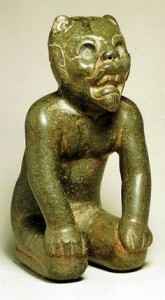
Jade sculpture of an Olmec Werejaguar god, retrieved from latinmericanstudies.org
“How did you become a werejaguar?” Jacks said.
“It was a long time ago, when I was sixteen. My father was French, but we travelled the Americas during my childhood. He had a hand in a little of everything, running goods from Guyana through the Caribbean Islands and all the way up the Atlantic to Québec. We were staying on a sugar plantation near Cayenne when the Portuguese and British landed to take the city. We ran off into the countryside to escape the bloodshed. It was nighttime. It was chaos. They were burning everything in town. I got separated from my father, and I wandered deep into the rainforest looking for him.”
Jacks hadn’t been the best student in history class, but he knew a conflict between the France, Portugal and Great Britain placed Benoit’s story something like two hundred years ago.
“You’re talking about colonial times.”
Benoit nodded. The space inside Jacks’ head expanded. How could Benoit have lived so long? There were some fine wrinkles in the corner of his eyes, but if they indicated something like a lifeline, he had one groove for every fifty years. He looked like he was in his late twenties, or early thirties at the most. Could it be another miracle of the werecat transformation? Jacks’ breath halted, waiting to hear the details of Benoit’s story.
“While I was wandering that night, there was a she-jaguar stalking me, though I didn’t know it at the time. She must have been very old, from the glory days of the Aztecs. The Europeans had conquered the native people with their gunpowder and their missionaries. There were very few of her kind left.
“Near daybreak, she showed herself to me when I was cornered on the bank of a river. Her spotted muzzle was big enough to wrap around my head, and she was so near she could close the space between us in seconds. I couldn’t move, even if there had been time or a place for me to go. I had never seen such a powerful animal.
“She must have known enough to sort me out from the foreign men who would kill her for her pelt. Maybe she needed to pass along the gift to somebody before she died or maybe she felt something more for me. I’ll never know. After she attacked me and slashed her chest, my father and a group of men gained up on us, following my screams. They shot her, and then stood around in disbelief as her feline body transformed into a young Aztec woman. They buried her by the river. We never spoke about what we saw again.”
“How did you survive all this time?”
“My father managed to work out some business dealings with the Portuguese, and we migrated back to Québec. After what happened to me, he vowed to never return to South America. He settled into the fur trade, which was very profitable. We had a house and a shop on Rue du Petit Champlain, among the wealthiest residents of Québec City. Over the years, I came to know my feline nature, but my father turned a blind eye to the changes I was undergoing. He blamed himself for losing track of me in the rainforest, and I don’t think he could bear to face what had happened to me.”
“What about your mother?”
“I never knew her. My father said she died in childbirth, some native girl from Guyana. He said I should always say she was French to avoid people’s prejudices. I was his only son. He wanted to make certain there would be no issue about his holdings passing to me. The inheritance came sooner than either of us had imagined. Our fourth winter in Québec, he died of pneumonia.”
Benoit’s face was hard. Jacks let a moment pass in silence. But he couldn’t keep the questions inside him contained for long. “What happened to the business?”
“I kept my father’s trade going for awhile, but while my friends and clients grew older, I wasn’t changing through the years. I had to disappear from people who knew me. I sold off everything and placed funds in foreign bank accounts. I traveled around the world, never staying in one place for more than ten years at a time. I became bored with it after awhile, which is why I returned to Québec. It was the closest thing to home for me.”
Jacks’ hand interlaced with Benoit’s as he thought about his remarkable past, and the profound accident of the two of them meeting in Mont Royal Park.
“How did you figure it out — what it meant to be a werecat, and all this history?”
“The information is out there if you weed through all the nonsense about witches and demonic possession. I had decades to study it. I visited Aztec ruins in Mexico and spoke with Zapotec mystics. I lived with the Ashanti People who worship the leopard in West Africa. In Masharata, India, there are villagers who have knowledge of the magic through the cult of Waghia, the Lord of Tigers. I realized what that she-jaguar did to me wasn’t a curse. It was the greatest gift anyone could give me.”
“Why did you choose to give it to me?”
Benoit’s hand tensed and gradually relaxed. “I sensed in you someone who could be my mate.”
Jacks’ words tripped over themselves. “What…how?”
“Panthers are solitary, but even we need companionship. Especially when we grow older, and we see that a life without connection is empty. I wasn’t looking for a mate, but I found you in the park that night, and I felt your link to the past, a miracle really. There are very few who are suited for the transformation.”
Jacks glossed over his last words, unsure of what he was saying. Instead he asked: “Were there others —” He fumbled for the phrasing. “You converted?”
There was a glimmer in Benoit’s eyes. “There was another many years ago.” His voice trailed off. Jacks gazed at him expectantly.
“I had a lover in Vietnam.”
Jacks squeezed Benoit’s ribs, teasing out more information.
Benoit glared at him in reproach. “You’re already showing your feline jealousy.”
Jacks laughed. “I want to know about your Vietnamese lover.”
“He was handsome, and graceful, and when he reared he became the most magnificent orange and black striped tiger.”
Jacks drew into himself. How did he measure up to a tiger? Benoit nuzzled against his neck.
“But he wasn’t loyal to me.”
“Why are you a panther and I’m a mountain lion?”
Benoit shrugged. “The traces of the old spiritual traditions open up our potential. My maternal ancestors had their roots in the Amazon people. Yours must descend from North America. The Ho-Chunk and Cheyenne tribes hold the cougar with great esteem.”
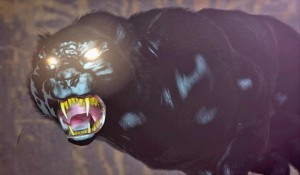
Illustration of the Wampus cat, a legendary feline monster that has its roots in Native American folklore. Retrieved from cryptomundo.com
Jacks thought on it. He had always been told he was a mutt of German and English heritage, but he had seen in his mother’s box of old photographs an old-fashioned portrait of his great-grandmother. She had long, straight hair, high cheekbones and a darker complexion, like a Native American. It had always been a curiosity, though his mother had said nothing about the photo and buried it beneath the others in her scrapbook box. Now, that discovery rang through Jacks with much more meaning. It was possible he carried Native blood from a branch of his family tree.
The idea grew inside him. His cougar nature might be part of his ancestry, a tradition of cat mysticism, passed down through an immutable bond. He had never felt like he was part of any religion, or any group for that matter. In fact, something inside him had always resisted the idea of being part of a community, and he wondered at that moment if it could be some lost spirit within him, refusing convention, wanting something more that would root him in the world. His mind roamed broader, considering the concept of a collective soul, and thrumming vagaries, the inheritance of ancestral wounds, and drawing strength from one’s forefathers.
In a moment, he was rearing. His feline eyes stared up at the star-speckled sky, and he could trace the lines of many constellations. They gradually came into focus as an expansive plane of images he had never seen before in the stars. A soaring falcon, a rattlesnake, the round head of a bear. There among them was a proud cougar, standing on its hind legs, looking down on him.
The springtime night was fresh and crisp. Jacks leapt down to the train tracks. His muscular limbs propelled him forward at an unbreakable pace. He slackened his jaw, the air filling up his lungs, feeling free.
~~~
If your interest is piqued, you can pick up The Rearing at Amazon, BN.com, or iTunes. And if you’d like to get the first three installments all together, here are buy links for The Trilogy: Amazon, BN.Com, iTunes.
Share this:





December 16, 2015
Giving Thanks to Family, Friends, and Fans
About seven years ago, I took up writing seriously. I was nearing forty, and you could say it was a bit of a midlife crisis. That may sound young for a midlife crisis, but taken literally, you’re a pretty optimistic fellow to call a major lifestyle change in your late forties or fifties a midlife crisis. With all of the bad habits I’ve subjected my body to over the years, I’ll be quite glad to reach my seventies.
I think of it as a midlife crisis in the sense that it had started hitting me hard that I had always loved writing fiction, but I had never made the time for it. Since college, through a combination of practicality and a healthy beat-down in creative writing classes, writing became my dream deferred. That’s not to say that I regret making a career as a social worker, but I felt like a big part of who I am had been left unventured. In Eriksonian terms, I was caught in that quandary of stagnation versus generativity, which brings to bear the big questions about meaningfulness and what kind of artifact of your life will be around after you’re gone.
To most of the people around me, my decision to ‘come out’ as a writer came as a surprise. I had been a social worker and an educator for over a dozen years, taking up the cause of LGBT youth. I’ll always be proud of that work and consider myself privileged to have made a career out of service to my community. Still, there was an entirely different creative side of me that I needed to explore.
I started working on a novel, joined a writer’s critique group, attended workshops and conferences, and read books about plot and structure and writing craft. I took the leap into submitting my work for publication, and in 2009, I placed my first short story in a literary journal. I followed up with that at a pretty brisk pace with more short story publications and now three books in print and two more coming out next year.
This writing thing of mine is more than a passing phase. It hasn’t brought me fame or fortune, but I keep at it because I love putting words on the page and I know this journey is a marathon, not a sprint. I also know that I couldn’t do it without the incredible support of my family and friends and the readers who have taken the time to let me know that they enjoyed what I wrote.
So, as the holiday season has us thinking about togetherness and giving, I wanted to thank the many people I have been fortunate enough to come to know as family. You’ve encouraged me, tolerated me during my reclusive, moody periods, and been there to celebrate with me. Thank you, and may 2016 be a stellar year for all of us.
Share this:





November 3, 2015
The Trilogy e-Book in Stores this Week
For the one-year anniversary of the special edition paperback, Vagabondage Press has released the Trilogy as an e-book, now available at retailers everywhere!
That title includes The Rearing, The Glaring, and The Fugitive, with all the artwork from the covers, and at a great price: $5.99.
You can pick up the Trilogy at that special price at Smashwords and Barnes & Noble.
Share this:





October 27, 2015
Pop Up Swap! With Elin Gregory!
I’m quite excited to introduce a new feature to my blog. It’s called the Pop Up Swap. Basically, it’s an opportunity to get to know some of my favorite authors better by exchanging our books and having a virtual dialogue about them at our respective blogs.
I’m calling it a pop-up because I am offering no guarantees on when or how often I’ll be doing these swaps. They could pop up at any time and disappear faster than a New York City landlord can raise the rent and send starving artists out on the street.
For my inaugural swap, I’m thrilled to have strong-armed, or rather politely convinced the delightfully talented and all-around delightful Elin Gregory to participate!!

Elin is a tad camera shy, but this is her favorite avatar
Elin Gregory is a British author from South Wales who writes historical fiction primarily in an M/M romance vein. She has a really interesting bio.
Elin Gregory lives in South Wales and works in a museum in a castle built on the edge of a Roman fort! She reckons that’s a pretty cool job. It certainly provides more than enough inspiration for her writing.
Although Elin usually writes on historical subjects, she has also written contemporary and historical paranormals, science fiction, crime and a Western, none of which have, as yet, been published. She likes her heroes hard as nails but capable of tenderness when circumstances allow.
Elin’s first published stories appeared in the British Flash and Tea and Crumpet anthologies produced by the UK Meet team. Her historical novella, Alike As Two Bees, and her first novel, On A Lee Shore, were published in 2012. Elin still can’t quite believe it. However, there are always new works on the go and she is currently editing a novel about the British Secret Service between the two World Wars, finishing one set in 6th century AD England and contemplating one set during the Second World War. For more about Elin, visit her blog.
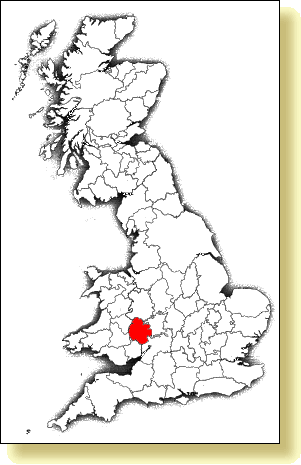
Hereford, South Wales, where Elin calls home
I’m a bit abashed to say I don’t recall precisely how Elin and I met. It was somewhere in the ether of the Internet, whether the blogosphere or the Twitterverse or the Triberr kingdom. I think our correspondence grew out of participating in the Hop Against Homophobia and Transphobia.
In any case, across an oceanic divide, we struck up an online friendship. A shared love for ancient world stories helped with that. I won Elin’s Alike as Two Bees in a contest, and I instantly became a fan. I persuaded her to swap our recent releases and have a conversation about them.
This is my interview with Elin after I read A Taste of Copper, which came out from Love Lane Books in 2014. Here’s the book’s back cover blurb:
 Olivier the squire worships the Black Knight and takes a fierce joy in his prowess as he defends a bridge against all comers. Olivier only wishes that his master loved him as much in return instead of treating him as a servant and occasional plaything.
Olivier the squire worships the Black Knight and takes a fierce joy in his prowess as he defends a bridge against all comers. Olivier only wishes that his master loved him as much in return instead of treating him as a servant and occasional plaything.
Then word comes that the King desires to cross the bridge. With an army approaching, a bright eyed archer enticing him to desert and the first cracks beginning to show in the Black Knight’s gruff demeanour, Olivier is left wondering if his honour is worth more than a chance for happiness.
Andrew Peters: Elin! Thanks so much for agreeing to this experiment of mine. I loved Alike as Two Bees, and I just fell in love with A Taste of Copper. There are many aspects of your work that I admire, and the first question that comes to mind is: where and how did you learn to write so well?
Elin Gregory: Well? My goodness, I think my editors might take issue with that, but thank you very much anyway. 




